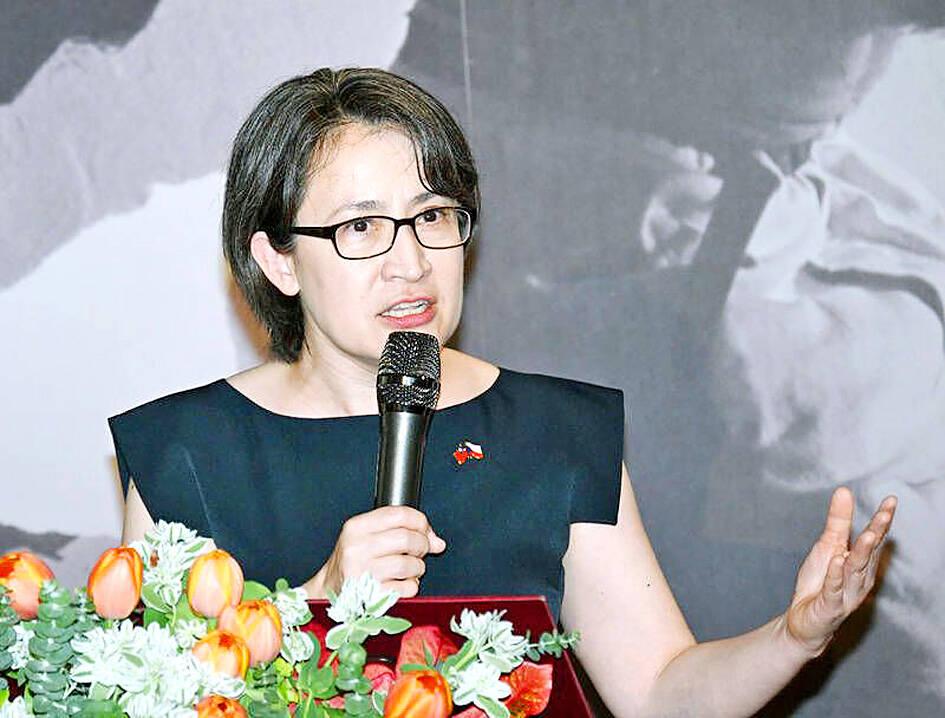Taiwan's Vice President Hsiao Bi-khim (蕭美琴) said Saturday that she would not be intimidated by the Chinese Communist Party (CCP), following reports that Chinese agents planned to ram her car during a visit to the Czech Republic last year.
"I had a great visit to Prague & thank the Czech authorities for their hospitality & ensuring my safety," Hsiao said on social media platform X.

Photo: Taipei Times
"The CCP's unlawful activities will NOT intimidate me from voicing Taiwan's interests in the international community," she wrote.
Hsiao visited the Czech Republic on March 18 last year as vice president-elect and met with Czech Senate leadership, including Czech Senate President Miloš Vystrčil (維特齊), during the three-day trip.
After her visit, reports surfaced that Chinese agents had followed Hsiao and had considered colliding with her vehicle, though the action remained in the planning stage.
The Czech Military Intelligence Service later confirmed it had monitored Chinese intelligence units attempting to carry out operations targeting "protected individuals."
On Saturday (US time), a social media account on X run by US Democratic lawmakers from the US House of Representatives Select Committee on the Chinese Communist Party said that "the CCP's planned attack" on Hsiao is a "clear escalation that highlights the growing threat of the CCP's transnational repression."
The post also cited the incident as a reason to reintroduce the Taiwan Allies Fund Act.
The bill, proposed in April by US Democratic lawmaker Raja Krishnamoorthi, would authorize US$120 million over three years to allow the US executive branch to assist Taiwan's diplomatic allies and unofficial partners facing CCP pressure.
Hsiao, who became Taiwan's vice president in May last year after the Democratic Progressive Party (DPP) won an unprecedented third term, is considered a "separatist" by Beijing.
In August 2022, China placed Hsiao on a public list of 10 "Taiwan independence diehards" on the website of its Taiwan Affairs Office, alongside other DPP officials Beijing seeks to "punish."

A small number of Taiwanese this year lost their citizenship rights after traveling in China and obtaining a one-time Chinese passport to cross the border into Russia, a source said today. The people signed up through Chinese travel agencies for tours of neighboring Russia with companies claiming they could obtain Russian visas and fast-track border clearance, the source said on condition of anonymity. The travelers were actually issued one-time-use Chinese passports, they said. Taiwanese are prohibited from holding a Chinese passport or household registration. If found to have a Chinese ID, they may lose their resident status under Article 9-1

Taiwanese were praised for their composure after a video filmed by Taiwanese tourists capturing the moment a magnitude 7.5 earthquake struck Japan’s Aomori Prefecture went viral on social media. The video shows a hotel room shaking violently amid Monday’s quake, with objects falling to the ground. Two Taiwanese began filming with their mobile phones, while two others held the sides of a TV to prevent it from falling. When the shaking stopped, the pair calmly took down the TV and laid it flat on a tatami mat, the video shows. The video also captured the group talking about the safety of their companions bathing

PROBLEMATIC APP: Citing more than 1,000 fraud cases, the government is taking the app down for a year, but opposition voices are calling it censorship Chinese Nationalist Party (KMT) Chairwoman Cheng Li-wun (鄭麗文) yesterday decried a government plan to suspend access to Chinese social media platform Xiaohongshu (小紅書) for one year as censorship, while the Presidential Office backed the plan. The Ministry of the Interior on Thursday cited security risks and accusations that the Instagram-like app, known as Rednote in English, had figured in more than 1,700 fraud cases since last year. The company, which has about 3 million users in Taiwan, has not yet responded to requests for comment. “Many people online are already asking ‘How to climb over the firewall to access Xiaohongshu,’” Cheng posted on

A classified Pentagon-produced, multiyear assessment — the Overmatch brief — highlighted unreported Chinese capabilities to destroy US military assets and identified US supply chain choke points, painting a disturbing picture of waning US military might, a New York Times editorial published on Monday said. US Secretary of Defense Pete Hegseth’s comments in November last year that “we lose every time” in Pentagon-conducted war games pitting the US against China further highlighted the uncertainty about the US’ capability to intervene in the event of a Chinese invasion of Taiwan. “It shows the Pentagon’s overreliance on expensive, vulnerable weapons as adversaries field cheap, technologically